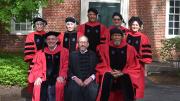Last summer, Dawn LaRochelle, J.D. ’96, catered a 250-guest Jewish wedding in the Berkshires of western Massachusetts. The bride, the daughter of a Reform rabbi, was a vegetarian and many of the groom’s ultra-Orthodox family kept strictly kosher. “When the bride said she wanted an all-dairy wedding, my heart sank,” says LaRochelle, owner of Bete’ Avon!, the only kosher caterer in the region. “Most seriously observant Jews don’t consider it a celebration unless there is some sort of meat.”
LaRochelle, who is Jewish and keeps “nominally kosher” at home, founded Bete’ Avon! (Hebrew for bon appetit; https://beteavonkoshercatering.com) in 2007 to serve a niche market: a substantial local Jewish population, including summering New Yorkers, that wants to keep kosher despite the lack of Orthodox stores, restaurants, or synagogues nearby. (She also runs the nonkosher Apogee Catering and Perigee, a restaurant in South Lee.)
After five fairly uninspiring years practicing law in Manhattan, she and her husband, Dennis LaRochelle, J.D. ’96, moved to the Berkshires right after 9/11. When the kosher-catering idea hit, she was 36, had three little boys, and had never cooked professionally. She had been her family’s chef growing up, however, and wined and dined classmates in Cambridge, co-founding the Harvard Law School Food and Wine Society. “Despite a lack of knife skills,” she says, “I can make anything taste and look fantastic.”
Annual sales of kosher food in the United States are about $14 billion; most of the consumers are not Jewish, but Muslims, Seventh-day Adventists, vegetarians, those with lactose or gluten intolerance, and health-conscious people who believe kosher food is of higher quality because it is more heavily vetted. Beyond the familiar rules--“No pork or shellfish,” “No meat and dairy served together”--kashrut laws can be complicated, and not just in reference to what parts of which animals to eat, who does the butchering, and when and how. Grape products made by non-Jews are prohibited, for example, including baking powders that contain cream of tartar, a by-product of winemaking. “But any cuisine in the world can be prepared under kosher law,” LaRochelle avers, and with the right ingredients.
Last summer’s client eventually decided that every dairy item at the wedding had to pass an even stricter measure of kashrut--cholov Yisroel--followed by about 1 percent of Jews. “It means that at certain parts of the processing of the dairy products, only an observant Jew was involved,” says LaRochelle. “The products are very hard to find and very expensive--and the bride wanted a lot of different cheeses.” So LaRochelle drove for hours through traffic and summer heat to the Orthodox Jewish community of Crown Heights, Brooklyn, to the only qualified store whose cheese met her own standards for taste. She also had to acquire new wedding china, “because people who keep cholov refuse to eat off kosher china that is not also cholov.”
At 5 a.m. on the wedding day, the mashigiah, who certifies that Bete’ Avon!’s events are kosher, had to “kashify” the large outdoor kitchens with industrial-strength blowtorches because the site’s generators had been down Friday and he could not work on Shabbat. (Typically, this entails running ovens at top heat for an hour, shutting them off, and leaving them closed all night.) In the end, the feast—including lemon truffle lollipops, zucchini ribbon rolls, pomegranate-honey glazed salmon, and summer vegetable and feta turnovers—was enjoyed by all. Clients “won’t get borscht, chicken soup, or gefilte fish from me, although I love these foods and do them very well,” LaRochelle declares. “They’ll get Delmonico steaks with roasted fresh figs and sherry parsley sauce--and they won’t even notice it’s all kosher!”










